Rep. Craig Horn, R-Union, said prior to the recent General Assembly short session, he had been told things would be different this time.
Legislative leaders had been working on the budget before the session even started. Horn said the plan for the budget was it would be a simple adjustment to the spending plan passed last year. It would take into account the actual amount of money coming into government coffers rather than the projected amount estimated last year. The budget would not be a policy document but a spending one. Furthermore, he said that the only bills leaders expected to take up would be those allowed by the rules. They would eschew the practice of gutting proposed committee substitutes and replacing the text with entirely new bills to get around the rules. Things would be different, Horn said, though he added that it was impossible to be sure.
The budget did go through quickly and early but not without significant controversy. The budget document was put into a conference report so that amendments couldn’t be added. The spending plan went through the joint appropriations committee and then went to the House and Senate floor. No other committees were able to debate the bill, and it was presented only hours after first becoming available to the public.
2018-18 money report
Budget bill
And while the plans for teacher raises, principal pay, and other items were not radically different than what was expected, the budget document was not without far-reaching policy implications.
Later in the session, after the budget was done, so-called “gut-and-amend” legislation popped up in committees, taking legislation eligible for consideration and revamping the bills to address completely different subjects.
From beginning to end, lawmakers were full of surprises — with little opportunity for education stakeholders to weigh in. So what happened? Here’s our overview below.
Budget overview
Lawmakers budgeted an additional $167,847,276 for the Department of Public Instruction in the short session budget for 2018-19 than what was planned in the two-year biennium budget passed last year. In total, the state is spending $11,474,167,250 on public instruction but, after receipts, only has to appropriate $9,546,315,927 to pay for it.
Legislators are spending an additional $43,799,296 for the N.C. Community College System than they had budgeted in last year’s biennium budget.
In total, the General Assembly is budgeting $1,582,025,522 for community colleges for the 2018-19 year. After receipts, it is appropriating $1,185,482,141 to hit that goal.
Budget highlight: Community college
The community college system budget includes more than $24 million in recurring dollars for salary increases and a total of almost $3 million for enrollment growth adjustments.
One of the big items in the community college system budget is almost $6.4 million recurring and a little more than $8 million nonrecurring in increased funding for short-term continuing education and workforce development. These funds are aimed at instruction and training that leads to industry credentials.
In addition, there were a variety of other provisions that are not directly tied to funds but could have an impact.
One provision extends the implementation date of the state’s Career and College Ready program. The program is a joint venture between community colleges and high schools focused on developmental education and remediation in high school. The state is now expected to scale up this program statewide by the 2020-21 school year instead of the 2018-19 school year.
Another provision sets up a study on how much it costs community colleges to offer classes in local jails. Community colleges already offer classes in prisons but are looking to expand correctional system instruction.
Budget highlight: K-12
Teacher pay
The focus of most General Assembly sessions is teacher pay. And while teacher pay was a highlight of lawmakers’ budget process, it did not end up becoming the focal point quite as it has in past sessions.
The action started on the first day of session with a huge teacher rally descending on Raleigh — thousands of educators from western and eastern North Carolina and everywhere in between. At least 40 of the 125 school districts cancelled classes. Teachers dressed in red shirts, carried signs, and demanded better pay and more resources from legislators. Many were hopeful that with a $356.7 million budget surplus, there was a possibility of getting more from lawmakers than the 6.2 percent average increase lawmakers had promised last year.




Teachers did end up getting slightly more, but only slightly. Lawmakers budgeted a 6.5 percent average increase for teachers and also included raises for veteran teachers (25+ years of experience). They will now make about $52,000 a year instead of the $51,300 planned in the two-year budget. That is significant because a criticism of Republican lawmakers is that they have often overlooked veteran teachers in their pay raise analysis. Republican leaders are promising that average teacher salaries will be more than $53,000 next year.
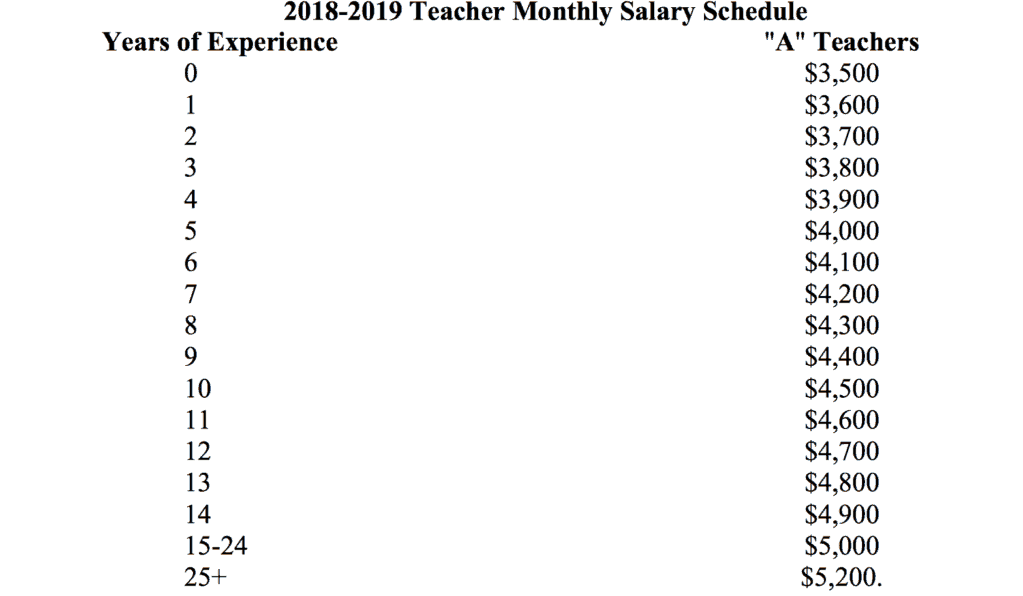

Democrats criticized this plan, pointing out that Governor Roy Cooper’s budget plan would have done more for teachers. His proposal included a minimum 5 percent pay increase for all teachers, with some making as much as 14.8 percent more. His plan, however, would have cost more than Republicans’ proposal, and he promised to fund it through changes to personal income and corporate tax cuts slated for next year.
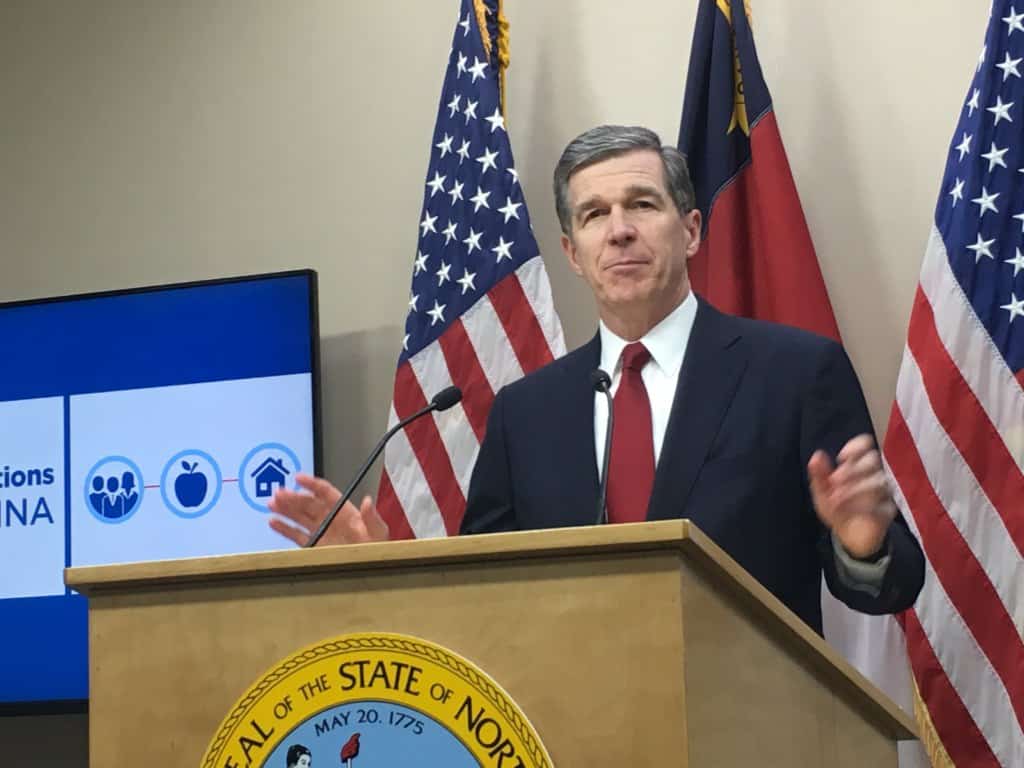

Rep. Susan Fisher, D-Buncombe, talked in a press conference about the governor’s proposal, saying that it included more equitable raises for all teachers.
“North Carolina has fallen nearly $10,000 behind the national average in teacher pay,” Fisher said. “We will never catch up if we give meaningful raises to some teachers, but not others.”
The press conference where Fisher spoke was held so Democrats could explain what amendments they would have added to the budget if they had been allowed to.
“We are in the middle of a budget process not seen in decades,” said Rep. Darren Jackson, D-Wake, the House minority leader. “The public had no involvement. Our caucus had no involvement. Many in the other caucus had no involvement.”
Principal pay received quite a boost from lawmakers this session as well.


The General Assembly put $35.4 million into principal and assistant principal raises last year and completely restructured the pay schedule. The budget passed this short session added an extra $12 million for principals alone, boosting principal pay by an average increase of 6.9 percent for this coming year.
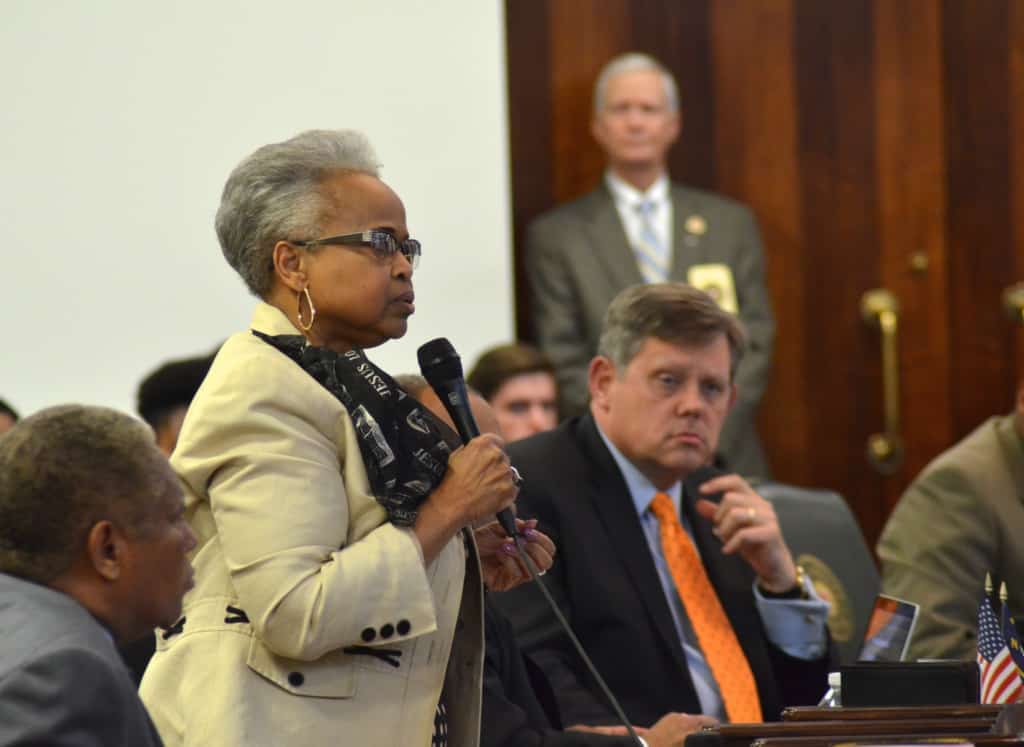

School safety
The budget includes $28 million in new, mostly one-time, grant money for school safety. The funds cover a diverse array of areas, including an app for students to report threats, more money for school personnel, training for mental health professionals, and funding to make school buildings safer.
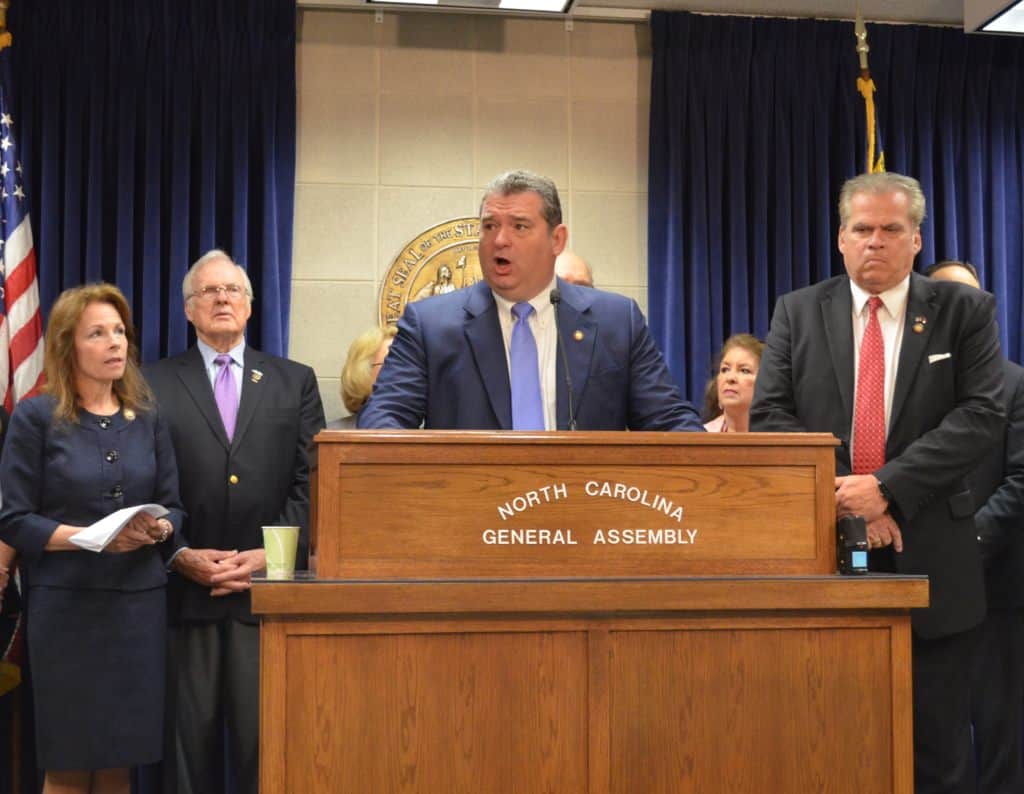

Democrats called out the plan, saying it didn’t do enough.
Rep. Carla Cunningham, D-Mecklenburg, said during one debate that the funding was short-sighted.
“This seems to be a short-term solution to what we’re seeing as a long-term problem in the country,” she said.
In a press conference prior to the release of the budget, Democratic lawmakers announced they were filing companion bills in the House and Senate to make schools safer, including more money for school resource officers and psychologists, and gun control measures they say could keep weapons out of the hands of dangerous or immature people. Their school safety plan was similar to the one Cooper proposed.
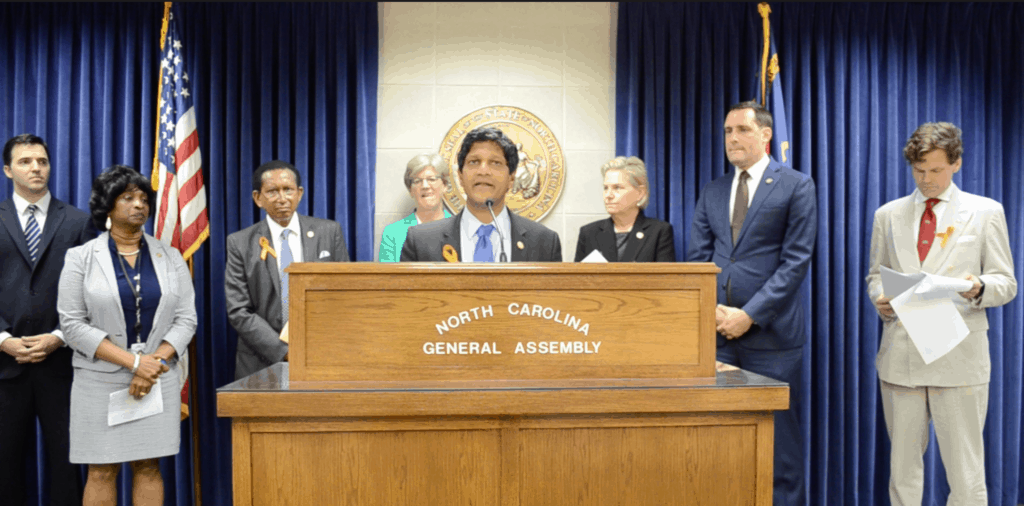

Those bills went nowhere. Democrats also made efforts to get some of their measures through the legislature by other avenues but ultimately failed.
Other provisions
When the public opened up the Republicans’ planned budget proposal, they found some surprises.
Much was made of $200,000 in grant-in-aid money that went to an organization called DonorsChoose, Inc. That money was supposed be used for classroom supplies in a number of Charlotte-Mecklenburg schools. Democrats questioned how the schools were chosen. Sen. Harry Brown, R-Onslow, co-chair of the Senate appropriations committee, said the schools were chosen by a lawmaker who was given discretion to use the money as he/she wished.
Rep. John Autry, D-Mecklenburg, one of the Democrats asking about the money, responded: “How does another member of this body submit such a list?”
Ultimately, DonorsChoose, Inc., refused the money, and this provision was removed from the budget in a technical corrections bill.
The budget did not reverse the $5.1 million in planned budget reductions for the State Department of Public Instruction, despite State Superintendent Mark Johnson and State Board members asking the General Assembly to do so. A recent $1 million audit of the department suggested significant long-term changes to the structure of DPI, and the letter sent from Johnson and the Board said implementing those changes would be difficult if the budget was cut further. The revised 2018-19 budget did, however, let DPI offset some of the budget cuts for one year using $3 million in reversions.
Last Friday, the last day of session, Superintendent Mark Johnson announced the elimination of 61 positions in the Information Technology and Educator Support Services departments at the state Department of Public Instruction to comply with the budget reductions. Twenty-one of those positions were already vacant.
Another provision that received far more attention would allow municipal governments to use property taxes to pay for public education, something which solves a problem faced by House Bill 514. House Bill 514 would allow the Charlotte-Mecklenburg towns of Matthews, Mint Hill, Cornelius, and Huntersville to start and operate their own charter schools. A report found the towns would not be able to build such schools because towns are not allowed to incur debt, meaning they would have to pay for the schools up front. The report also stated that towns could not raise property taxes for schools without a public referendum.
The provision in the budget not only would let cities use property taxes for education, it also says that taxpayers will not be held liable for school-related debt, clearing the way for House Bill 514.
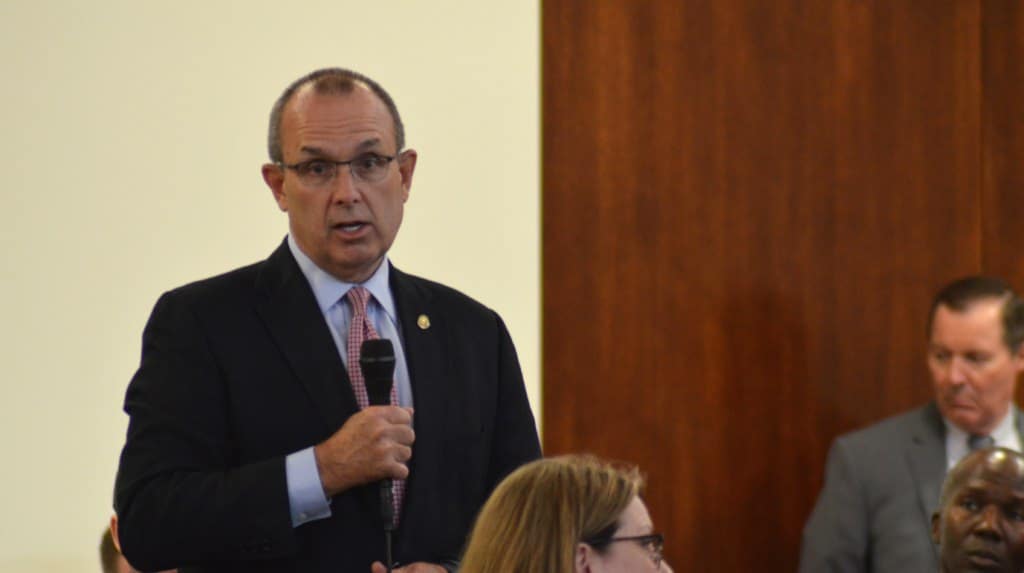

Critics have called House Bill 514 precedent-setting as towns have never been allowed to operate their own charter schools. Furthermore, some say the enrollment preference granted to these schools subverts the traditional expectation that charter schools do not pick favorites when it comes to which students to take. Also, some lawmakers expressed concern that the bill would allow these mostly-affluent towns to reimpose segregation in their localities.
Towards the end of its journey through the General Assembly, an amendment was put forth that stripped a provision in the bill allowing teachers at these potential town charter schools to opt into the state’s health and retirement plans. The amendment was an attempt to make sure the bill would not be considered a “statewide” bill.
The move led Sen. Jerry Tillman, R-Randolph, to vote against it, which is notable because he had already voted for the bill in committee, though he always expressed reservations about it.
“I made the mistake of voting for it one time. I’m not going to make it a second time,” he said.
One more provision in the budget creates a program called the Schools That Lead pilot program. This provision instructs the Department of Public Instruction to partner with an organization based in Delaware called Schools That Lead Inc., to give professional development to educators in up to 60 schools around North Carolina starting this coming school year.
The program will offer services to “high schools working to increase on-time graduation,” middle schools trying to prepare students so they will not have to repeat ninth grade for multiple years, and elementary schools “working to reduce the number of students with early warning indicators of course failures, absences, and discipline.”
Other bills
Cursive writing and more
House Bill 986 originally clarified reporting requirements related to cursive writing and multiplication table instruction in schools. Schools are already supposed to be teaching those two subjects and reporting that fact to the state, but this bill makes the reporting requirement clearer so that the state can assess who is teaching these subjects and how.
Along the way to its passage, a number of additions were made to the bill.
The House added a provision that would place students who score a five on math end-of-grade or end-of-course tests into advanced math classes the following year. That provision was met with wide approval in both chambers.
The Senate tacked on four more changes.
One requires the State Board of Education to create annual report cards for educator preparation programs that are available to the public and submit annual performance reports to the legislature.
Another requires Superintendent Mark Johnson to study and make recommendations on reducing testing not mandated by the state or federal government.
A third provision would require the state Department of Public Instruction to develop a mental health training program and suicide risk referral program. The measure would also force the State Board of Education to repeal its school-based mental health initiative and replace it with a new training program overseen by Johnson.
A final provision would allow the district in the state with the highest percentage of restart model schools to opt into a renewal school system that would give the entire district charter-like flexibility. This provision applies only to the Rowan-Salisbury school system. Restart schools are continually low-performing schools that apply to operate under the restart reform model, allowing them to have charter-like flexibility. The Rowan-Salisbury school district has decided to opt into this model.
The bill passed the Senate unanimously and the House 94-11.
ISD changes
As an example of the “gut and amend” strategy, lawmakers took up a bill entitled “An Act to Provide for Teachers Allotments for Geographically Isolated K-12 Schools,” in a House education committee, stripped it of its language, and added instead various changes to the Innovative School District (ISD) school law.
Those changes include removing the language that lets schools who choose another reform model — such as Restart — be exempt from consideration for the ISD, lifting the five-school cap on the ISD and changing a provision that would have forced Innovation Zone schools into the ISD if they didn’t exceed academic growth in the last two years of their five-year term in the Innovation Zone.
Schools in the Innovative School District have charter-like flexibility and are run by outside organizations other than the local school district, including potentially for-profit charter or education management organizations.
The Innovation Zone is an area of a school district where schools are given charter-like flexibility but continue to be managed by the school district. If a district is participating in the ISD and has more than 35 percent of its schools identified as low-performing, all of those schools could become part of an Innovation Zone should the district elect that option. Otherwise, districts with an ISD school can pick up to three other low-performing schools to go into an Innovation Zone.
While this amended bill passed the House, it was not taken up for concurrence in the Senate.
School buildings
School districts and advocacy groups have been clamoring for a a $1.9 billion statewide school construction bond referendum to be put on the ballot during the next election, especially in light of the $8 billion in construction needs districts say they have. The K-3 class-size restrictions, slated to go into effect over the new few years, added to the tension as lower class sizes would mean more classes and thus more room, something the state wasn’t offering to help pay for.
However, despite voting through multiple constitutional amendments to be put on the ballot in November, the General Assembly declined to put the school bond referendum on there, too.
In a statement sent via email after the close of session, Cooper criticized Republicans’ actions related to school building construction and other issues.
“Republican leaders have refused to even discuss school construction funding,” he said. “Instead, they’ve spent the end of session stacking the November ballot with hasty, misleading attempts to rewrite the state constitution to create barriers to the ballot box and roll back the foundational checks and balances of state government.”
The General Assembly did, however, include in its budget $241 million in lottery funds next year, and plans for more money in future years, for building and upgrading school facilities. That money is targeted at cash-strapped rural counties.
Income tax cap
The General Assembly passed a constitutional amendment that will be on the ballot this November, capping the state’s income tax at 7 percent. Critics of this move say this could limit funding for education in North Carolina going forward. Originally, lawmakers were aiming for a 5.5 percent income tax cap, but that proposal did not receive the support it needed to clear the legislature.
Other education action
State Board v. Superintendent Mark Johnson
A case that lasted all of 2017 and has continued into this year was finally resolved by the North Carolina Supreme Court while the short session was still underway.
The State Board of Education sued the state over House Bill 17, legislation that passed in December of 2016 when the General Assembly held a special session. The legislation rearranged the responsibilities held by the superintendent, transferring certain powers of the State Board of Education to Johnson.
The State Board challenged the constitutionality of that move, but the Supreme Court ultimately sided with Johnson. However, both sides have claimed victory. Attorneys for the State Board said the ruling reiterates that the State Board has the ultimate authority over education in the state while Johnson praised the Court’s conclusion that he is the leader of the state Department of Public Instruction. Find more details on this case here.
Jumping off from there, lawmakers added a provision to a bill mostly unrelated to education, House Bill 374, that relates to this case.
The provision language states that policies pertaining to the State Board’s responsibility for supervising and administering the public school system and the funds associated with that, as well as the delegation of authority from the State Board to the superintendent are repealed. It states, however, that the State Board may readopt “rules or policies related to internal management that are not inconsistent” with statutory requirements. The implications of this provision aren’t yet clear. Staff at the Department of Public Instruction are analyzing it in response to a request for more clarity on its consequences.
Bargaining for teacher pay
The United State Supreme Court issued a paradigm-shifting ruling in Janus v. AFSCME. The ruling essentially says that people who do not belong to unions but benefit from their collective-bargaining efforts cannot be forced to pay union dues. This decision overturns a precedent that has been in place for decades and which critics say could lead to substantial declines in membership for unions and decreased influence.
According to The New York Times, union dues are currently mandatory for workers in 22 states. In the wake of teacher walkouts in many states, including a “rally” in North Carolina aimed at better pay and resources, some are concerned about the impact on teacher’s unions. North Carolina doesn’t have a teacher’s union, but the North Carolina Association of Educators is an advocate for teachers, and its actions are sometimes described by critics as union-like. The NCAE is affiliated with the National Education Association, a national organization that is considered a “professional organization” in some states and a “union” in others.
Mike Antonucci of the Education Intelligence Agency recently posted data he received from the NEA on affiliate membership. His numbers show that in 2016-17, the NCAE had a membership of 19,729, which is down 8.2 percent from the year before and down 44.9 percent from five years before.
Last week
Education was mostly not the focus of the last few weeks of the General Assembly, but as lawmakers neared the end of the short session, they made some last-minute moves that could impact public schools.
Last Thursday, just before lawmakers left town, both the House and the Senate took up Governor Roy Cooper’s nominees to the State Board of Education.
Cooper announced three proposed appointments to the State Board of Education in May 2017. Two of those appointments, former state Department of Public Instruction administrator J.B. Buxton and former UNC-Asheville Associate Professor of Education Sandra Byrd, were new names, while Reginald Kenan, the third pick, is already a member of the State Board.
The two new appointees would have replaced Wayne McDevitt and Patricia Willoughby, whose terms expired at the end of March 2017.
While the General Assembly approved Kenan, they voted down both Byrd and Buxton. In the case of Byrd, Sen. Chad Barefoot, R-Wake, suggested she would likely be a bad influence on what he considered an already-litigious State Board of Education. Lawmakers gave no explanation for Buxton’s rejection.
Before finishing up last week, the House also approved a study of the needs of high-achieving, low-income students.
The study committee will meet through the rest of this year and look at what it would take to restart a school focused on this student demographic. A school called North Carolina Advancement operated under a similar charge in the 1960s.
When the General Assembly did finally adjourn Friday, it wasn’t for good. The adjournment resolution will suspend the session for now, but lawmakers will return in November after the elections. On November 27, the session will be back on and there are no restrictions on what legislation can be considered.
The total budget for education, including community colleges and the UNC System, is $16,083,808,838.
Cooper set a record for the most vetoes in a biennium. He vetoed 23 bills, and the General Assembly overrode 18 of them.
Click here to read what Cooper had to say about the short session in a press release.




